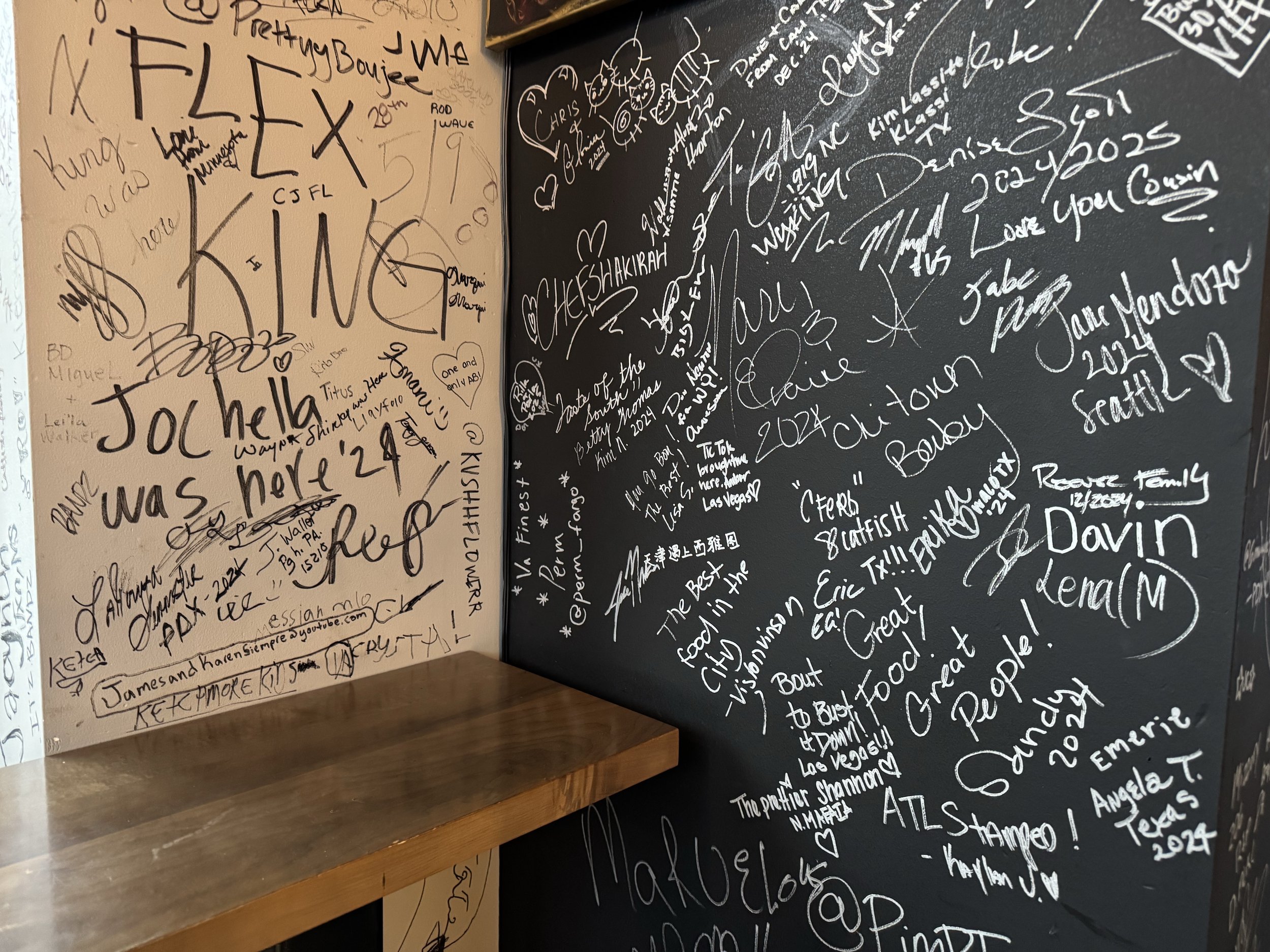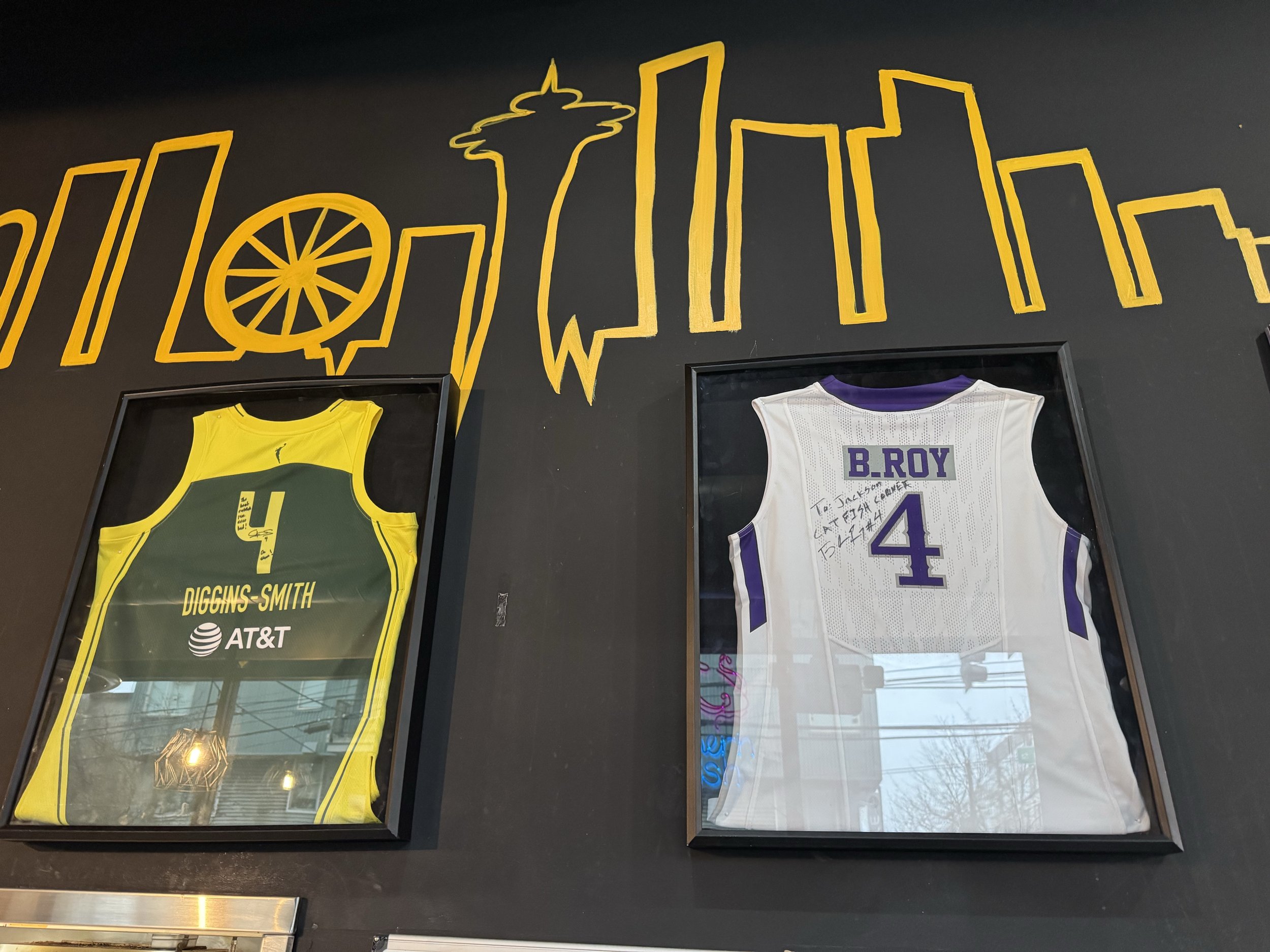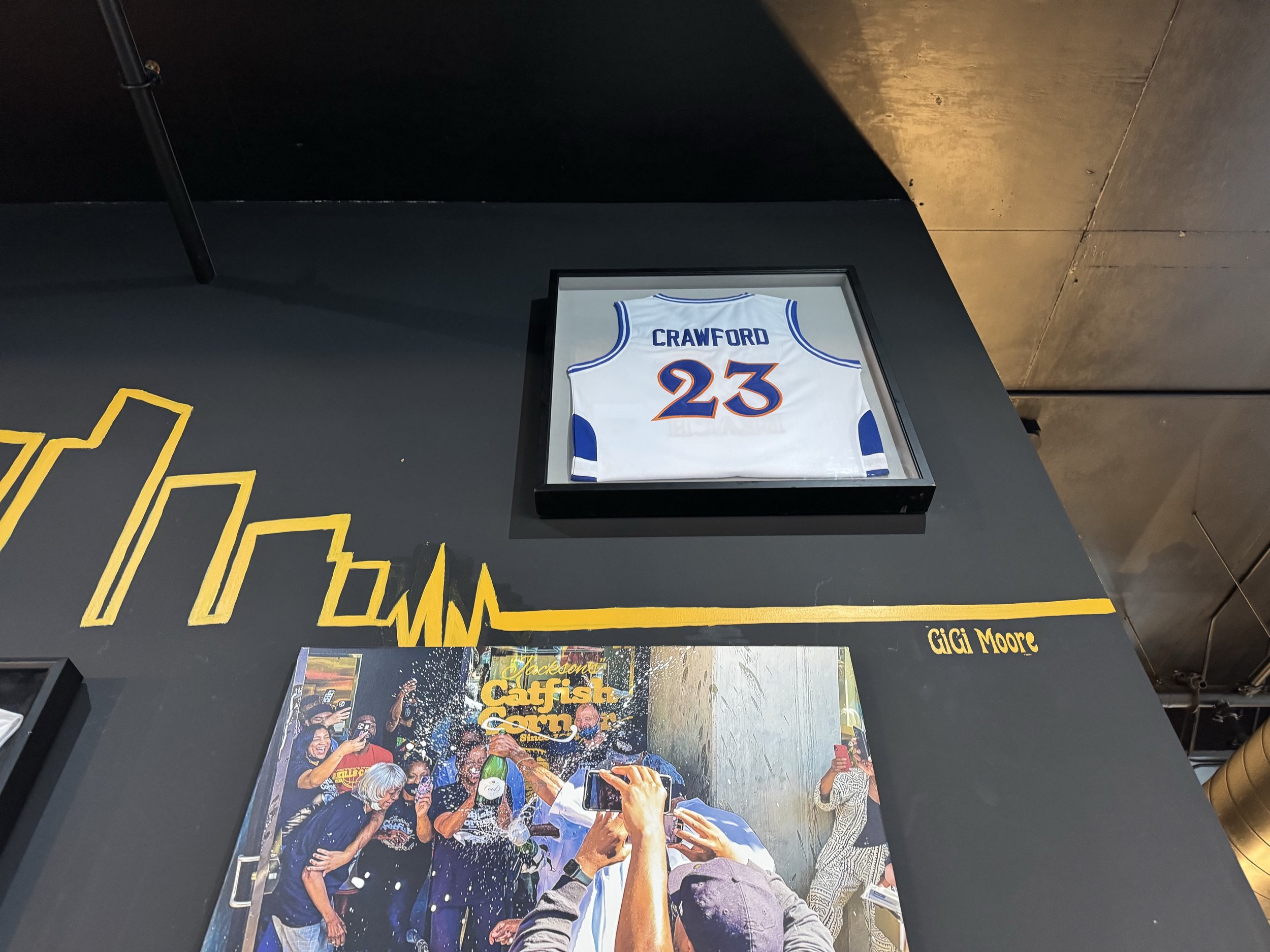Jackson's Catfish Corner Closes: A Seattle Institution Shuttered Amidst Changing Tides
"I just feel like I want more, and I don't think Seattle can offer that to me right now," - Jackson’s Catfish Corner owner Terrell Jackson.
(Photo: ProofNThePlay)
By Omari Salisbury
A somber mood settled over Seattle's Central District today as Jackson's Catfish Corner, a culinary landmark and community pillar, served its last meal. The unexpected announcement came this morning via owner Terrell Jackson's Instagram post, leaving patrons and community members stunned and saddened. The line outside the door, filled with people wanting to say their goodbyes and get one last taste of Jackson's famous catfish, spoke volumes about the restaurant's impact.
"I just feel like I want more, and I don't think Seattle can offer that to me right now," Jackson expressed in an interview, his voice tinged with both finality and a hint of wistfulness.
The line was out the door as customers and friends stopped by for one last meal and to say goodbye. (Photo: Omari Salisbury)
The closure marks the end of an era, a four-decade legacy that began with Jackson's grandparents in 1985. Jackson's Catfish Corner has been more than just a restaurant; it has been a cultural touchstone, a gathering place where memories were made and community was fostered.
"Man, this is, this brought us together," reflected Londel Monroe-Walker, a loyal customer who rushed to the restaurant for one last meal upon hearing the news. "This is what we believe in, the CD and the Black community. This is what Seattle is. We love them, and we appreciate them."
Londel Monroe-Walker was the first customer of the day. (Photo: Omari Salisbury)
A Legacy of Love and Catfish
For 40 years, Jackson's Catfish Corner has been synonymous with Seattle's soul food scene. The restaurant's signature catfish, hush puppies, coleslaw, and tartar sauce have garnered a devoted following, drawing in everyone from local residents to celebrities and athletes.
The restaurant's walls are adorned with countless patrons' signatures. According to Terrell, singing the wall has become a very big thing, and then there is a wall dedicated to the 206. "That's the 206 wall," Jackson explained, "It’s a lot of Seattle on that wall, you know, people like Jamal Crawford, Brandon Roy, even Avery, my best friend since middle school." The wall stands as a tangible representation of the community and the memories created within those walls.
More Than a Meal
Jackson's Catfish Corner was more than just a place to grab a bite to eat. It was a place where people connected, celebrated, and found a sense of belonging.
"This is a community place, a place of gathering," Jackson emphasized. "People come to Catfish Corner to see people that [they] ain't seen in years - 'Oh, my friend, in 15 years, my pastor, my teacher.' This is it."
Keeping the Legacy Alive
The original Catfish Corner, located on MLK and Cherry, where Fat's Chicken and Waffles now stands, was a beloved community staple. Over the years, Jackson has poured his heart and soul into keeping the business alive, even when it meant cooking outside and at pop-up locations. The opening of the 23rd and Jackson location on Juneteenth 2021 was a triumphant moment, a testament to his dedication and the community's unwavering support.
"That was a big day," Jackson recalled, "I've always told my grandparents that the original place... was on the corner, but with, like, a little hole in the wall. You know, I'm saying it was raggedy, raggedy kind of breaking down. But my grandparents always had opportunity to do better, do more, but they didn't want to. They were happy with that place. But in my mind, as a kid, I always thought my grandparents deserved more... So when I opened up on grand opening, that was for my grandma and she was there."
I was also there at the ribbon cutting, witnessing the joy and pride that radiated from Jackson and the community that day. It was a spark of hope, a sign that Black-owned businesses could thrive in the Central District.
Video: Grand Opening of Jackson’s Catfish Corner on 23rd and Jackson on Juneteenth 2021 (The Morning Update Show)
The Challenges of a Changing City
The closure of Jackson's Catfish Corner comes at a time of great change for Seattle. Gentrification, rising costs, and shifting demographics have all contributed to a challenging environment for small businesses, particularly those owned by people of color.
Jackson opened up about the factors that led to his difficult decision. "Neighborhood foot traffic, the ones [that] supported a business like this one, are no longer really here," Jackson lamented. The Central District, once a thriving hub for Black-owned businesses and a tight-knit Black community, has undergone significant demographic shifts due to gentrification and rising costs. "What am I going to do about that now? You know what I'm saying. So that makes me have to close this place down."
Marie Kidhe, a native Central District resident and managing principal at Reimagine Solutions LLC, echoed Jackson's sentiments. "You create something magical, where everyone around you looks like you, the businesses next to you look like you, and then one day you look up and it's just you and maybe the next person that looks like you is five blocks away." The changing landscape of the neighborhood has left many Black-owned businesses struggling to stay afloat.
“We have to be diligent about supporting our people while they’re in motion, not when they’re in a deficit.” - Marie Kidhe, Managing Principal at Reimagine Solutions LLC (Photo: ProofNThePlay)
Rising Costs and Policy Impacts
The rising cost of doing business in Seattle, coupled with the upcoming minimum wage increase, also played a role in Jackson's decision. "I know that the minimum wages went up to 20 bucks an hour... I know that's hard for my business as a small black business," Jackson explained. "I'm not Amazon or Walgreens or Walmart who can pay their employees that much."
A Legacy of Love and Loss
Jackson's Catfish Corner was a cornerstone of the community, a place where memories were made and traditions were passed down. Its closure represents a significant loss for Seattle, particularly for the Black community. As a Central District resident, Angela Poe Russell said, "It just feels like we're losing part of ourselves."
The impact of this closure extends beyond the loss of a beloved restaurant. It is a stark reminder of small businesses' challenges in a rapidly changing city and the urgent need for policies and community support that ensure their survival.
The closure of Jackson's Catfish Corner has amplified the sense of loss and uncertainty within the Black community, as it comes on the heels of news of other Black-owned businesses shutting their doors. In the past week alone, the Seattle-Tacoma area has seen the closure or impending closure of several establishments that have been integral to the cultural and economic landscape of the city. These include Nate Jackson's Super Funny Comedy Club in Tacoma, which closed just last week, Plum Bistro on Capitol Hill, and Flowers Just-4-U in the Central District, which will close on January 15th. These closures have left many feeling disheartened and questioning the future of Black-owned businesses in Seattle.
During my interviews, the weight of these collective losses was palpable. Community members expressed their concerns about the disappearing safe spaces and economic opportunities that Black-owned businesses provide. The closures have sparked a wave of sadness and reflection, with many questioning what can be done to support and sustain these vital pillars of the community.
"It's a wave of sense of loss, you know?" Angela Poe Russell remarked, highlighting the cumulative impact of these closures. "We're losing things." The sentiment was echoed by others who expressed their concern about the changing landscape of the city and the potential erasure of Black culture and community.
"It just feels like we're losing part of ourselves." - Central District resident Angela Poe Russell (Photo: Omari Salisbury)
Myesha Mitchell, owner of My Time For Massage and community activist, voiced her concerns about the closure of Jackson's Catfish Corner and the broader trend of Black-owned businesses disappearing from the Central District. "I'm feeling a sense of loss," she expressed, emphasizing the impact on the community. "It's going to change the dynamic for all of us." Mitchell's words highlight the vital role that Black-owned businesses play in creating a sense of community and belonging. Their closure not only diminishes economic opportunities but also erodes the cultural fabric of the neighborhood, leaving a void that is difficult to fill.
Are we a Vanishing Seattle?
Cynthia Brothers, founder of the media project Vanishing Seattle, which documents the changing physical and cultural landscape of the city, arrived at Jackson's Catfish Corner early this morning. "One of my followers sent me the story that Terrell posted earlier today, that today was going to be the last day of Catfish Corner," she explained, "So, yeah, wanted to come up and pay my respects, get a last order in and yeah, just document the last day open."
Reflecting on the closure's impact, Brothers emphasized, "It's kind of hard to overstate... the impact that a business like Catfish Corner has had." She acknowledged the restaurant's significance as a beloved institution spanning three generations, a testament to its importance within the community. "I feel like it's not just a loss to like this particular neighborhood, but when we lose a place like that the whole city, I think is really the poorer for it," she lamented.
Brothers sees the closure as part of a larger, systemic issue impacting Seattle's small businesses. "I think there's something kind of broken overall, like systemically, when small business owners can't survive," she observed. She highlighted the role of shifting demographics, real estate development, and rising costs in creating a challenging environment for these businesses, particularly those owned by people of color.
Despite the somber occasion, Brothers expressed hope for the future and emphasized the importance of community support. "We have to keep, you know, pushing for as a community, as a city, because it is harder for small business owners... We need that ecosystem in order to be... a healthy city."
"I think there's something kind of broken overall, like systemically, when small business owners can't survive," - Cynthia Brothers of Vanishing Seattle (Photo: Omari Salisbury)
Terrell Jackson Looks to the Future
The weight of running Jackson's Catfish Corner has taken a toll on Terrell Jackson's health. In addition to the daily stresses of managing a restaurant, Jackson also shouldered the responsibility of upholding his family's legacy and serving the community. The long hours, staffing challenges, and rising costs all contributed to a heavy burden, ultimately leading to a recent health scare. This health scare served as a wake-up call for Jackson, prompting him to prioritize his well-being and re-evaluate his priorities. The decision to close the restaurant was not made lightly, but it was a necessary step for Jackson to protect his health and find a new path forward.
"I've done all I can with this business," Jackson stated. "I just think it's time for me to do something different. I need a new high."
Though the closure is undoubtedly a loss for Seattle, Jackson is already looking ahead to the future. He plans to relocate the business to either Houston or Atlanta, cities with larger Black populations and potentially greater opportunities for his business to thrive. "I gotta go somewhere where it's needed," Jackson explained. "I know my product is needed in Atlanta, for sure."
Jackson is also considering a shift in his business model, potentially focusing on pop-up events and festivals rather than a brick-and-mortar location. "I can be at the Black festivals now for the three-day weekend, Friday, Saturday, Sunday, come get it, and then that'd be better," he mused.
Despite the challenges he's faced, Jackson remains grateful for the community that has supported him and his family's business for four decades. "I appreciate you guys for supporting this business, this small, Black business, for 40 years in Seattle," he expressed. "I really appreciate that. Y'all did it. I couldn't have got this far without y'all."
A Call for Support
The closure of Jackson's Catfish Corner, along with other recent closures of Black-owned businesses in Seattle, is a stark reminder of the challenges small businesses face, particularly those owned by people of color. It calls for us to rally around our local businesses and support them however we can.
As I've witnessed firsthand with Converge Media, running a small business is not easy. The struggle to keep the doors open is real as we battle month to month to literally keep our lights on due to a lack of advertising revenue across our platforms, including our show Back2Besa on FOX 13 Seattle. We continue to operate only through a limited number of advertisers, community support, and our commitment to service.
Farewell, Jackson's Catfish Corner. You will be deeply missed.





